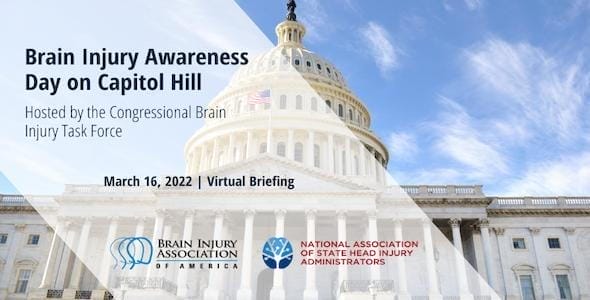Brain injuries are commonly caused by motor vehicle accidents and on the job injury accidents. The Brain Injury Association of America and the National Association of State Head Injury Administrators and Congressional Brain Injury Task Force co-chairs Reps. Bill Pascrell, Jr. (D-N.J.) and Don Bacon (R-Neb.), invite you to join us at a virtual Brain Injury Awareness Day briefing on the importance and value of advocacy on the afternoon of March 16. Attendance is free, but registration is required. Click here where you can register online to attend.
To help increase awareness about brain injuries during March Brain Injury Awareness Month, the following five facts about concussions can be helpful to victims suffering from brain injuries:
Concussions Happen More Frequently Than You Think
You get a sudden bump or jolt that can cause your brain to bounce back and forth in the skull violently, causing injuries of varying degrees to the brain. Concussions are type of TBIs that can cause functional changes in the way your brain works. Concussions most often occur as a result of blows to the head during:
- Sports and recreation activities
- Car accidents
- Slips and falls
- Veteran Military combat related brain injuries involving explosives
- Workplace accidents
You can also sustain a concussion from simple household slip and fall, like accidentally slipping on black ice, falling down the stairs, and hitting your head against a hard surface. Fortunately, most concussions are not life-threatening, but in some cases the long-term effects can affect some injury victims and require prolonged medical care and treatment.
Concussion Symptoms Aren’t Always Obvious
If you are the victims of a head injury event, you should know a concussion may or may not present itself in obvious ways. TBIs may cause the following symptoms to develop, such as:
- Headaches
- Dizziness
- Nausea
- Ringing in the ears
Be aware, that concussions can sometimes go undetected because their symptoms may not appear right away after a head injury. Unfortunately, after head injury the symptoms can include:
Most victims who experience concussions will fully recover within a few days or weeks. Others may, unfortunately, experience consequences for longer periods of time, depending on the severity of the effect on the brain. If you or someone you care about has had a serious head blow or jolt of some sort, early medical intervention can mean the difference between full recovery and living with some of those lingering longer-term and unpleasant post-concussive symptoms. Your early diagnosis of a concussion may mean you can establish individualized brain injury rehabilitation regimen to maximize your individual outcome.
Older Adults Are at Higher Risk for Concussions, But Preventive Measures Can Be Taken
When you think about head injuries, typically you think of car accidents, workplace injuries, or sports and professional athletes, but did you know that older adults are higher risks of concussion. According to the Harvard Medical School head injuries from falling are a common cause of hospitalization and even death among individuals over 65 years of age. Plus, the Centers for Disease Control (CDC) reports that the data collected suggest a full four out of five TBI-related emergency department visits in older adults (aged 65 years and older) were as a result of falls. Knowing this, it’s not surprising that hospitalization rates stemming from TBI-related emergency room visits were highest among individuals 75 years of age and older.
What Can You Do To Help Seniors Prevent Falls and Concussions?
You can help your senior members of your family and friends become of the steps to take to avoid potential concussion-related falls in their homes or businesses. You can honor Brain Injury Awareness Month at home by taking a moment to think about ways your elder’s home is little safer? Proactive steps you can take include:
- Making sure railing exists
- Removing home hazards like throw rugs that can be trip hazards
- Proper lighting in the living space to help avoid missteps or tripping
- Using assistive devices (like handrails, grab bars, raised toilet seats)
- Understanding the effects of medications
- Staying mobile and active to keep the body working
- Wear sensible shoes to avoid slipping or tripping in winter weather
Helmets Are Preventive Head Injury Measures.
Over the years, CDC reported studies have consistently shown that people of all ages can reduce the risk of serious brain injuries by simply wearing age appropriate helmets. You can encourage children and loved ones to wear helmets when riding a motorcycle, bike, or horseback riding, as well as when take part in activities with a higher potential for blows or impact to the head, such as:
- motorcycle
- bicycle
- scooter
- Football
- Lacrosse
- Roller skating
- Ice Skating
- Snowboarding
- Snowmobiling
- Skiing
- Hockey
Your helpful understanding and awareness that helmet-wearing should be second nature to children, so they develop this good habit for life like wearing a seatbelt in vehicles. The Joseph Dedvukaj Firm actively promotes brain safety via helmet wearing with our annual head injury month blog article. You can share our blog article to raise brain injury awareness using your Instagram, Facebook, Twitter, LinkedIn or the social media network of your choice, and be sure to tag us at The Joseph Dedvukaj Firm when you do so.
FDA Cleared New Types of Sport Equipment Designed to Reduce Head Trauma.
Recently, the FDA announced authorization to allow marketing of a new protective devices intended to be worn around the neck of sports athletes aged 13 years and older during sports activities to help protect the brain from the effects related to repetitive sub-concussive head blow or impacts. The device is known as a Q-Collar that is basically a ring worn around your neck, which according to the manufacturer, applies a compressive force in order to increase blood volume, which in turn helps reduce movement of the brain in the skull, minimizing the impact of the brain hitting the inside of the skull. In one study, 77 percent of high school football players who were part of testing of the Q-collar device did not have any major changes to the electrical nerve signals (white matter regions) of the brain detected after undergoing an MRI study. This is in contrast to comparison to 73 percent of non-wearers of the Q-collar device who had significant electrical changes detected in the brain tissue.
The FDA warned that the Q-Collar does not replace other protective devices and should be worn together with other protective sports equipment associated with specific contact sport activities. For example, if you wear a helmet and shoulder pads during football, you must still wear this equipment in addition to the Q-Collar. Plus, the Q-collar will not protect athletes from all harmful effects of head impacts, so while wearing Q-collar you still need to take steps to avoid direct impact to the head and neck. However, the data available does not demonstrate that the Q-collar will prevent concussion or serious head injury.
Learning More About the Brain and Concussions
The Brain Injury Association of America (BIAA) provides detailed information on the complex parts of the brain and how each has its specific task, controlling how we walk, talk, eat, and balance, make decisions, process information and more. If you’re interested in learning more about brain injuries, including about treatment, diagnosis and support for patients and families, visit www.biausa.org.
Looking For A Brain Injury Lawyer?
If you’ve been injured in a car accident with a suspected brain injury, concussion, or head injury, call the car accident brain injury specialists at the Joseph Dedvukaj law firm for no obligation free consultation to learn about your rights and what you need to do next.
Contact us 24/7 for a free no obligation consultation at 248-352-2110 or toll free 1-866-477-3563 (1-866-HIRE-JOE).


